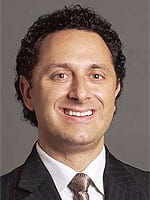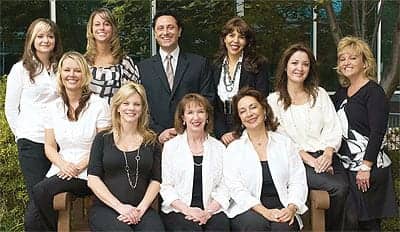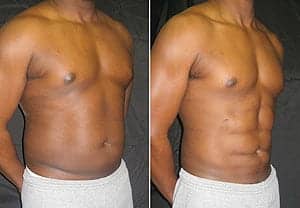Bitar enjoys “the never-ending learning and teaching aspect of being a plastic surgeon.”

George J. Bitar, MD, FACS
Fairfax, Va
How does one become “the best?” For one northern Virginia board-certified plastic surgeon, the answer is simple: Learn from “the best.”
After completing his plastic surgery residency at the University of Virginia and cosmetic surgery fellowship training at Charlotte Plastic Surgery Center in Charlotte, NC, though “tapped out of resources” from student loans, George J. Bitar, MD, FACS, made a decision. “I figured if you invest that much time [for your medical training], an extra 6 months can be the cherry on top,” he says. “I wanted to broaden my horizons and learn what other people with 30 to 40 years of experience were doing all over the world. I figured it would cut down on the time it would take me to learn. After all, the human body hasn’t changed in a thousand years. Why reinvent the wheel?”
Bitar e-mailed a dozen plastic surgeons around the world he deemed “best in the field.” His hope was that half would respond and allow him to spend 1 month each, training with and learning from them. To his credit, all 12 surgeons responded; and Bitar spent the better part of 2001 spanning the globe visiting half dozen of these mentors.
Bitar proudly announces that the experience has earned him the privilege of performing surgery on six continents, and he adds that he’s treated patients of 104 nationalities in his practice. “No type of ethnic issue is a concern,” he says. “I feel like I can accommodate people based on their customs and their view of aesthetics, whether it’s Asian eyelids, black skin with a concern about keloids, a Middle Easterner who is conservative, or a Latino or Latina who wants to have explicit plastic surgery.”
Gone Global
Bitar’s international training began close to home in Beverly Hills, Calif, with Richard Ellenbogen, MD, FACS. To his peers, Ellenbogen is known as “The Father of Fat Grafting,” Bitar says. He moved to the New York City area to study with Vincent Giampapa, MD, FACS, who is on faculty at the University of Medicine and Dentistry, New Jersey, in Newark. Bitar credits Giampapa with developing the suture suspension neck lift—a procedure both men have written and lectured about extensively.
Bitar crossed the pond to train with Daniel Marchac, MD, in Paris. Bitar says he considers Marchac “one of the world leaders on facelifts and breast lifts.” Next, a short trip away to London, Bitar trained with Yannis Alexandrides, MD, FACS, with whom Bitar recently formed an academic and clinical partnership to enhance the quality of care for patients in both practices.
Bitar considers Alexandrides “an innovator in the field of injectables in Europe,” and adds that he popularized fillers and muscle relaxants in London in the late 1990s.

In Johannesburg, South Africa, where he traveled next, Bitar learned scar-management techniques from world leader Alan Widgerow, MD. Widgerow developed a treatment from a plant that grows in South Africa. A short plane trip away he continued his cosmetic surgical training in Melbourne, Australia, with Bryan Mendelson, MD, who Bitar calls “a great anatomist as well as a great surgeon and a great teacher.”
His final month-long fellowship was in Rio De Janeiro, Brazil, to study with well-known plastic surgeon, teacher, and lecturer Ivo Pitanguy, MD, who is known around the world as “The Father of Brazilian Plastic Surgery.”
“I enjoy very much the never-ending learning and teaching aspect of being a plastic surgeon,” Bitar says. Since 2006, Bitar has become a mentor himself, hosting what he calls “a uniquely intense and very competitive summer internship for medical students.
“They engage in observing all aspects of patient care, help in preparing talks, conduct patient surveys, help in our unique-to-our-institute ‘Days of Beauty,’ which are 2 days per month with injectables, skin care, and fractional lasers all day, as well as participate in helping to write articles and textbook chapters for plastic surgery publications,” he adds.
In addition to the formal internship, Bitar also invites American and foreign plastic surgery residents and fellows to do informal rotations on lasers, injectables, and surgical procedures at his offices in Manasses and Fairfax, Va. “We have an open-door policy for teaching,” Bitar says. “Everybody is welcome as long as it does not interfere with our first-rate patient care.”
Bitar is very proud of the quality of care he offers to his patients. He believes it all started with his mom, whom he politely refers to as “the founding mother.” He notes, “We have a very friendly, family-like atmosphere in our institute. My mom is the ‘greeter,’ and she helps to create a very pleasant atmosphere that puts patients at ease.”
It’s all part of what Bitar refers to as a “patient-centric” practice, which he says begins with offering extended hours to accommodate everyone’s schedules and ends with extensive follow-up. Rare in the field, Bitar offers Saturday hours plus extended weekday evening hours.
Bitar also provides his patients with much educational information: from his useful Web site (drbitar.com) to quarterly newsletters he and his wife write and edit themselves, to regular e-mails (his patients get the very latest news about cosmetic surgery, lasers, skin care, and injectables).
In addition to educating his patients, Bitar claims his staff is also very well-informed in the field of cosmetic surgery. “We pride ourselves in keeping our highly skilled and professional staff very well-educated on the latest safety techniques in plastic surgery during weekly staff meetings,” he says. “I also send my staff to attend national conferences regularly.”
Though in practice nearly 10 years, the past 6 years Bitar’s practice has been 100% cosmetic, which he believes is important for several reasons. “The average plastic surgeon does about 50% reconstructive and 50% cosmetic,” he explains. “I only do cosmetic. Also, I do about 500 cases a year, which means that I do a significantly higher volume than the average plastic surgeon in most categories in which I operate—anywhere from double to five times as much in certain categories. The more a plastic surgeon does a procedure, the better the outcomes, the fewer the complications, and the happier the patients. It is that simple!”
The Patient and the Procedures
Bitar believes his “personal approach creates a great relationship with his patients.” That approach includes meeting twice with every patient before surgery to ensure they understand the surgery very well, offering references of those who have had the same procedure, providing detailed information about procedures, and having his nurse call patients 2 nights before surgery to allay fears and answer last-minute questions.

Bitar prides himself on his excellent follow-up, which includes a phone call the night of surgery and multiple offices visits thereafter. He says this constant contact “ensures potential problems are identified very early on, and our complication rate is much lower than the national average.”
Scar management is also important to him. “Our scar-management system is one aspect of which we are very proud, because it enables us to give the patient the best possible achievable scar,” Bitar says. “We do a lot of scar management both on old scars and new ones. We educate our patients about scar healing and use a unique scar-management system developed by Dr Widgerow, which has been scientifically proven to enhance scar outcome postoperatively.”
Meeting the Man
A member of the American Society of Plastic Surgeons and American Society of Aesthetic Plastic Surgeons, Bitar has presented at numerous meetings and written several book chapters and articles on plastic surgery techniques.
Most recently, he presented talks titled, “Transaxillary Breast Augmentation: A Ten-Year Experience,” and “Suture Suspension Necklifts with Tisseel Sealant: An Update,” at an international meeting in Lebanon in October. Bitar, a Lebanese immigrant, is a proud member of The Lebanese Society of Plastic and Reconstructive Surgery, a 200-member group of plastic surgeons of Lebanese descent from 43 countries.
Growing up in Lebanon in the 1970s and 1980s contributed to Bitar’s decision to become a plastic surgeon. “I grew up in war in Lebanon and had witnessed war’s atrocities firsthand,” he says. “I wanted to be able to help people restore deformed body parts when I grew up. I have had a lot of satisfaction going on operative trips to do medical missions in Third-World countries, as well as pro bono work here in the US.”
Now a father to 1-year-old Johnny, Bitar reminisces about growing up and the words of his father, a pediatrician and his very first role model, still fresh in his mind. “ ‘People’s need for you is God’s gift to you,’ he would tell me. With that spirit, I grew up learning to appreciate the talents of others and how best to nurture those talents and allow them to reach their full potential. I continue to strive to reach my own potential.”
Amy Di Leo is a regular contributor to PSP. She can be reached at [email protected].



